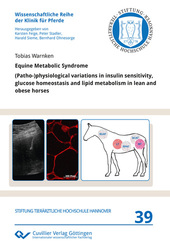| Fachbereiche | |
|---|---|
| Buchreihen (97) |
1382
|
| Nachhaltigkeit |
3
|
| Gesundheitswesen |
1
|
| Geisteswissenschaften |
2372
|
| Naturwissenschaften |
5408
|
| Mathematik | 228 |
| Informatik | 320 |
| Physik | 980 |
| Chemie | 1364 |
| Geowissenschaften | 131 |
| Humanmedizin | 243 |
| Zahn-, Mund- und Kieferheilkunde | 10 |
| Veterinärmedizin | 108 |
| Pharmazie | 147 |
| Biologie | 835 |
| Biochemie, Molekularbiologie, Gentechnologie | 121 |
| Biophysik | 25 |
| Ernährungs- und Haushaltswissenschaften | 45 |
| Land- und Agrarwissenschaften | 1005 |
| Forstwissenschaften | 201 |
| Gartenbauwissenschaft | 20 |
| Umweltforschung, Ökologie und Landespflege | 148 |
| Ingenieurwissenschaften |
1798
|
| Allgemein |
98
|
|
Leitlinien Unfallchirurgie
5. Auflage bestellen |
|
Erweiterte Suche
Equine Metabolic Syndrome (Band 39)
(Patho-)physiological variations in insulin sensitivity, glucose homeostasis and lipid metabolism in lean and obese horses
Tobias Warnken (Autor)Vorschau
Leseprobe, PDF (100 KB)
Inhaltsverzeichnis, PDF (41 KB)
Variations in insulin regulation reflect either as tissue insulin resistance or insulin dysregulation result in moderate to severe hyperinsulinemia in horses and ponies suffering from the Equine Metabolic Syndrome (EMS). Several pathomechanisms provoking equine insulin resistance have been suggested, but insulin signaling in healthy horses has not been studied in detail so far. Thus the objective of this PhD project was to investigate equine insulin sensitivity, glucose homeostasis and lipid metabolism by combining examinations of insulin signaling on a protein level in different main metabolic tissues and analyses of dynamic hormone and metabolite changes during acute stimulations by either oral glucose application or IV insulin and glucose injection. Furthermore, systemic markers of insulin resistance were analyzed by an innovative targeted metabolomics approach to provide better understanding of potential pathomechanisms involved in impaired insulin regulation in horses. In conclusion, equine-specific insulin signaling, the marginal relationship of insulin sensitivity to obesity and strong associations of high plasma insulin concentration to cellular oxidative stress depicted not only a special physiological condition but also indicate novel pathophysiological conditions underlying EMS.
| ISBN-13 (Printausgabe) | 9783736998063 |
| ISBN-13 (E-Book) | 9783736988064 |
| Sprache | Englisch |
| Seitenanzahl | 118 |
| Auflage | 1. |
| Buchreihe | Wissenschaftliche Reihe der Klinik für Pferde |
| Band | 39 |
| Erscheinungsort | Göttingen |
| Promotionsort | TiHo Hannover |
| Erscheinungsdatum | 04.06.2018 |
| Allgemeine Einordnung | Dissertation |
| Fachbereiche |
Veterinärmedizin
|
| Schlagwörter | Equine Metabolic Syndrome, Insulin sensitivity, Insulin resistance, Insulin dysregulation, Lipid metabolism, Glucose homecstasis, Insulin signaling, Metabolome |








